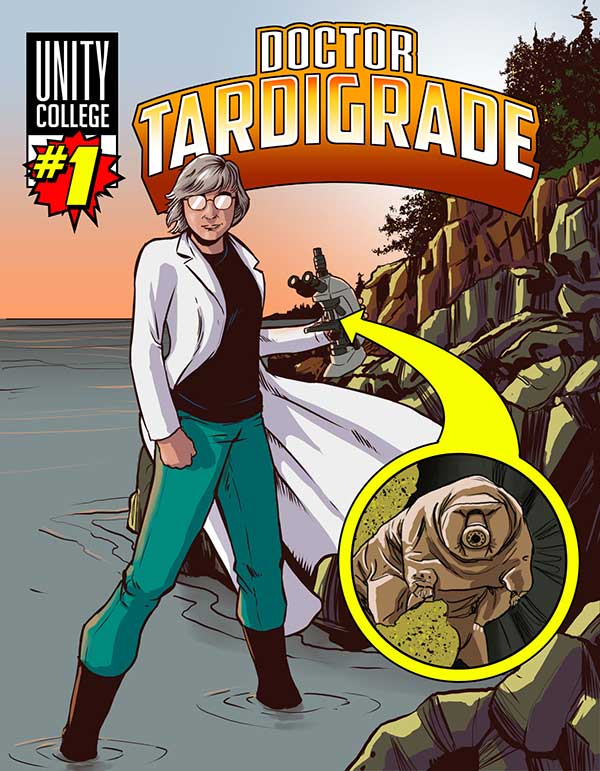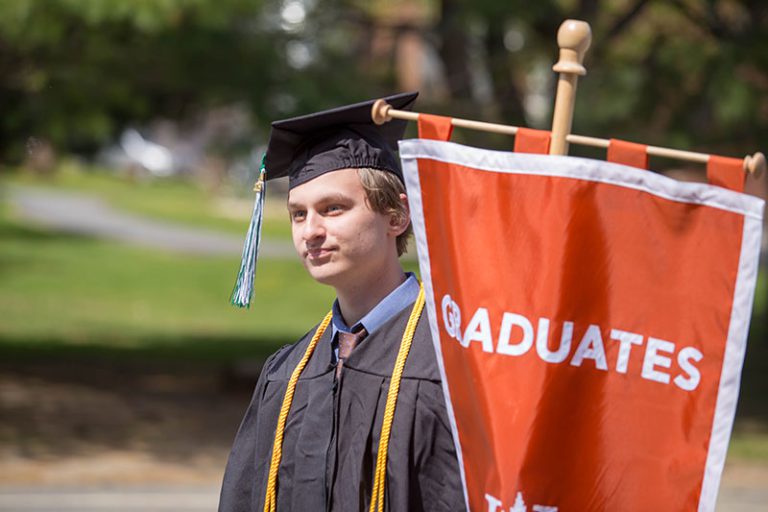
National Science Foundation rewards college for leadership in transdisciplinary learning.
A trio of Unity College professors has earned a share of a National Science Foundation grant that will integrate mathematics, writing, and marine biology at America’s Environmental College.
The grant is part of a $2.65 million National Science Foundation IUSE Math grant awarded to 11 collaborating institutions to reform mathematics courses, according to Unity College Associate Professor of Mathematics Dr. Carrie Diaz Eaton.
IUSE is short for “Improving Undergraduate STEM Education.” STEM is a popular acronym for “science, technology, engineering and mathematics.”
Diaz Eaton said Unity College will receive approximately $30,000 per year for five years to integrate marine biology, writing, and mathematics, with an emphasis on the calculus curriculum.
“I’m grateful, but not surprised, for this latest National Science Foundation recognition of the work and leadership of innovative Unity College faculty,” said Unity College President Dr. Melik Peter Khoury. “This is not the first time, nor the last, that a national scientific granting body has recognized Unity College for its work using math to help address environmental problems and making the college classroom truly interdisciplinary. Indeed, Unity College is well-known for this type of new paradigm in higher education. I congratulate Dr. Diaz Eaton and her team on their efforts to better prepare students for sustainability issues in marine conservation.”
In particular, the grant will target issues facing coral as a case study. Unity College faculty contributing to the project include Diaz Eaton, Professor of Marine Biology Dr. Emma Perry, and Associate Professor of Writing Dr. Stephanie Wade.
“We think coral is a compelling transdisciplinary problem,” Diaz Eaton said. “Even though this grant targets the mathematics classroom, our hope is that, through all of the disciplines involved, we will identify themes that can be used in a variety of classrooms.”
“We will, in turn, integrate calculus into the marine biology courses, especially Coral Ecology and Management, Invertebrate Zoology, and Marine Biology,” Perry said. “This study will allow us to build calculus and modeling skills throughout the Marine Biology curriculum.”
“Including writing along with mathematical and scientific reasoning will prepare students to communicate what they learn to multiple stakeholders,” Wade said.
“Unity College is excited to be on the leading edge of transdisciplinary education, working across education silos and across institutions to create a strong, relevant academic experience for our students,” Khoury said.
As part of the grant, Diaz Eaton is co-editing a special issue of the journal PRIMUS (“Problems, Resources, Investigations for Mathematical Undergraduate Studies”) in a special issue on interdisciplinary conversations to be published next year. She will also help coordinate five additional colleges and universities, Augsburg College, Ferris State College, Lee University, Oregon State University, and San Diego State University, who are also working on mathematics curriculum collaborations with life science, health science, and chemistry partners.
While this is a new grant, it’s not the first National Science Foundation award to come to Unity College by way of Diaz Eaton’s work in interdisciplinary mathematics education.
Diaz Eaton and collaborators from five other colleges and universities were awarded a five-year, $2.9 million National Science Foundation grant to support coordinated initiatives of the Quantitative Undergraduate Biology Education and Synthesis (QUBES) Consortium in 2014. QUBES is an alliance of professional societies and academic institutions united around common goals in quantitative biology education.
Diaz Eaton said the project will utilize the CJ and Rick O’Connor and Clifford Family Coral Wet Lab — a unique Unity College facility that allows students to study and culture corals.
The wet lab is one of a constellation of hands-on facilities that support animal studies at Unity College. From studies in biology and taxonomy to animal care and restoration, wildlife biology, pre-veterinary programs, and more, students at Unity learn to identify, manage, care for, and educate others about animals using the wet lab, animal room and heritage barn facilities.
The lab is a cornerstone of the hands-on approach to the marine biology program at Unity College, which was redesigned in 2014 to better meet the challenges of ocean sustainability in the 21st century. As part of those changes, classes in coral reef management and Calculus I are now required for the marine biology program.
“Many of the investigative projects in the calculus sequence are targeted toward Wildlife Biology, Sustainable Energy Management, and Earth and Environmental Science majors, since those comprise the largest percentage in the classroom,” Diaz Eaton said. “But this will allow us to bring relevant quantitative examples in marine issues into the marine biology classroom as well as the calculus classroom.”
“We think integrating calculus and writing with coral reefs and marine conservation will give Unity College students a distinct advantage, so they will better understand the concrete effects of climate change and help solve the problems our oceans face,” Perry said.
The 11 colleges and universities, including Unity, have formed a consortium to renew the early college mathematics curriculum led by Dr. Susan Ganter, a professor and director of the School of Education at Virginia Polytechnic Institute and State University’s College of Liberal Arts and Human Sciences.
Editor’s Note: This material is based upon work supported by the National Science Foundation under Grant No. 1625771. Any opinions, findings, conclusions, or recommendations expressed in this material are those of the author(s) and do not necessarily reflect the views of the National Science Foundation.



